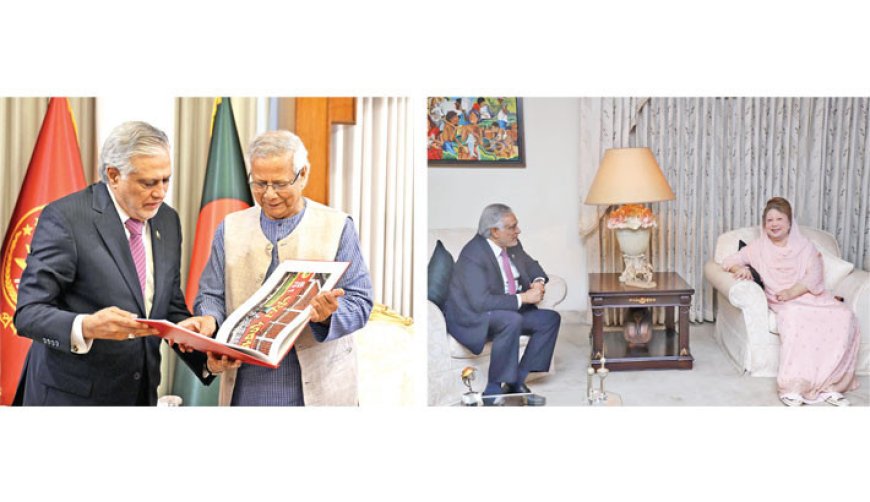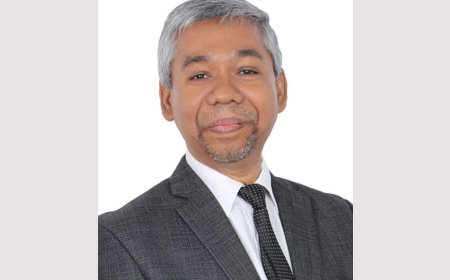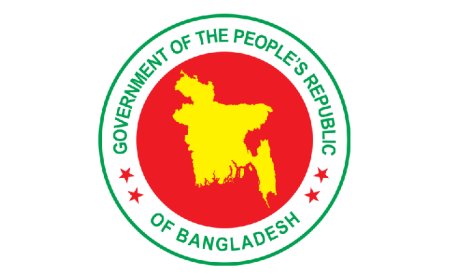Bangladesh, Pakistan ink visa agreement, five MoUs despite lingering 1971 dispute
Bangladesh, Pakistan ink visa agreement, five MoUs despite lingering 1971 dispute

Bangladesh, Pakistan sign visa waiver deal, five MoUs despite 1971 tensions
Bangladesh and Pakistan on Sunday signed a visa waiver agreement along with five memorandums of understanding (MoUs), marking a step towards reviving bilateral ties despite lingering disputes over the 1971 Liberation War.
The agreements—finalised during the second day of Pakistan Deputy Prime Minister and Foreign Minister Ishaq Dar’s visit to Dhaka—cover visa exemptions for diplomatic and official passport holders, trade cooperation, academic exchanges, as well as collaboration between national news agencies and strategic studies institutes.
Dar’s Dhaka engagements included meetings with Chief Adviser Prof Muhammad Yunus, BNP Chairperson Begum Khaleda Zia, and Jamaat-e-Islami Ameer Dr Shafiqur Rahman. The visit comes amid continuing disputes over an official apology for the 1971 genocide, repatriation of assets, and the return of stranded Pakistanis.
Foreign Affairs Adviser Md Touhid Hossain underlined the need for continued dialogue, while Dar argued that most 1971-related issues had already been resolved through earlier settlements.
Visa waiver and MoUs
At a signing ceremony in Dhaka, the two sides sealed a visa exemption deal for official and diplomatic passport holders. The five MoUs covered:
-
formation of a joint trade working group,
-
cooperation between the Foreign Service academies,
-
collaboration between BSS and APPPC news agencies,
-
partnerships between the Bangladesh Institute of International and Strategic Studies (BIISS) and Pakistan’s ISSI.
Delegation-level talks also emphasised expanding maritime and air connectivity, easing visa procedures, and engaging the private sector to unlock economic potential.
Education, healthcare, and sports
Dar announced Pakistan’s new “Pakistan-Bangladesh Knowledge Corridor,” offering 500 scholarships for Bangladeshi students over five years. He also pledged advanced medical treatment, including prosthetics, for 40 individuals injured in Bangladesh’s July Uprising, and offered training for Bangladesh’s national hockey team.
Regional and global issues
Talks extended to wider regional concerns. Bangladesh urged Pakistan’s continued support for Rohingya repatriation to Myanmar, while both sides jointly condemned Israel’s actions in Gaza and called for an immediate, permanent ceasefire.
Unresolved 1971 issues
After the meetings, Touhid Hossain rejected Dar’s assertion that 1971 issues were settled, reiterating Dhaka’s demands for an official apology, recovery of assets, and repatriation of stranded Pakistanis. He stressed that resolving these disputes was essential for normalising relations.
Dar, however, maintained that the issues had been addressed in 1974 and again during General Pervez Musharraf’s visit in the 2000s.
Courtesy calls
Later, Dar met Chief Adviser Prof Muhammad Yunus at Jamuna, where they discussed youth exchanges, trade, connectivity, and regional cooperation. He also visited Khaleda Zia to inquire about her health and held a half-hour meeting with Jamaat chief Dr Shafiqur Rahman, accompanied by senior party leaders.
What's Your Reaction?





















































































